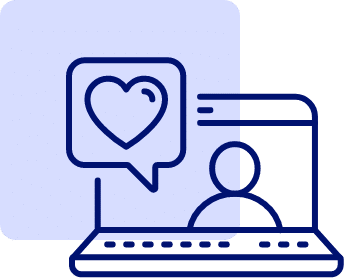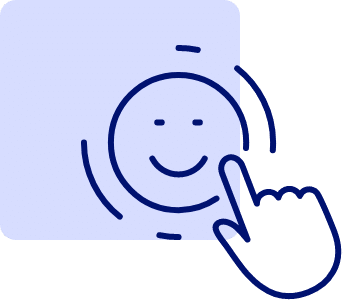Therapy For
Kids & Teens
Every parent wants to watch their kids grow up to live a happy, healthy life. It can be so difficult to watch your child struggling to make new friends, navigate difficult emotions, or struggle to cope after experiencing a major life change. Our team at Mind Works is here to help your child develop new skills, feel more confident, and thrive in their everyday life – setting the foundation for a flourishing future.
1. Intake & Goals
We’ll launch the therapy process by covering the initial intake steps. If your child completed any assessments prior to therapy, your therapist first analyzes the results and takes time to understand your child’s plan of action. If you are starting this journey with therapy, we’ll ask you to fill out some paperwork and a questionnaire to help your provider tailor your child’s specific treatment plan.
2. Therapy Weeks 1-3
The first few weeks of treatment are critical for introducing your child to the therapy process, building trust with their provider, and showing them that therapy is safe. For children ages 3-12, this means demonstrating how play therapy works, the toys they can use, and expectations for treatment. For older children or teens that are undergoing talk therapy, this looks like gradually helping your child to become comfortable talking with the therapist, listening to their concerns, and better understanding their unique way of thinking and responding to the world around them.
3. Therapy Weeks 4-8
We call these couple of weeks the “Working Stage.” Now that trust has been established between your child and the therapist, the focus shifts to presenting problems. During this part of the process, it’s likely your child may begin to resist treatment or even increase problematic behaviors. You may notice they test boundaries during sessions or in external environments, such as home and school. Many parents may start to feel discouraged as these behaviors escalate, but we tend to see behaviors worsen before they eventually get better.
4. Therapy Weeks 9-12
Next we enter the “Growing Stage.” This is when children will really being to make strides in their treatment. Children start to adapt to the process and put in the hard work necessary for personal growth. Over the course of these four weeks, they will learn how to employ coping skills, better express their emotions, figure out healthier ways to manage behaviors, and make progress their specific treatment goals.
5. Empowerment
Your child will continue to use and develop their coping skills. At this point, children are often better self-regulated and more resilient. The key here is to empower children to use their newfound skills independently. Your child’s therapist will encourage them “fly solo” and practice all they have learned in therapy with continued guidance before graduation. This is necessary so that the child feels equipped and prepared to continue without the therapeutic relationship.
6. Graduation
The graduation stage is all about discharging your child and setting them up for a happy and healthy goodbye. Your child will be ready for this stage when they are consistently demonstrating their new skills, and their emotional and behavioral needs have been stabilized across all environments, including home and school. Children often begin to approach this stage around week 20, but some may need more sessions than others. It might be appropriate to taper therapy sessions to every other week or once a month until graduation.
Explore our available therapy options:
Play Therapy
Play therapy at Mind Works offers a creative and expressive outlet for children to explore emotions, learn coping strategies, and resolve challenges through the power of play.
Teen Counseling
We utilize a range of evidence-based therapy modalities to help teens navigate challenges, build resilience, and prepare for emerging adulthood.
Parenting Support Services
Mind Work’s parent support services equip caregivers with effective strategies and insights to strengthen family dynamics and support their child’s growth and healing,
Begin Your Child’s Success Story
Ready to get started or have more questions for our team before moving forward? Give us a call or fill out a simple form online to start the journey toward your child’s thriving future.
How Therapy Helps Your Child Thrive at Home, School, and Play
While you may already have a good idea of some of your child’s areas of weakness or noticed symptoms that point to common behavioral, emotional, or developmental disabilities, testing can help confirm your concerns or identify new factors to consider. Here are some ways screening and assessments set your child up for success.

Improved Emotional Regulation
Therapy can help children as young as three and teens learn to regulation and express emotions in a healthier manner.

Enhanced Social Skills
Your child’s therapist can help them to better play with others, manage conflicts, and maintain thriving relationships.

Greater Self-Esteem
Play and talk therapy empowers your child to overcome challenges, learn and develop their skills, and grow in confidence.

Improved Academic Performance
By addressing problematic behaviors and addressing learning challenges, therapy can help your child succeed at school.

Coping Skills Development
We strongly emphasize coping skills in sessions, helping your child to develop the strength and resilience to face life’s challenges.

Better Family Relationships
Therapy can deeply impact your family dynamic at home. Addressing strain early on encourages trust and collaboration with your child.
How Therapy Helps Your Child Thrive at Home, School, and Play
While you may already have a good idea of some of your child’s areas of weakness or noticed symptoms that point to common behavioral, emotional, or developmental disabilities, testing can help confirm your concerns or identify new factors to consider. Here are some ways screening and assessments set your child up for success.

Improved Emotional Regulation
Therapy can help children as young as three and teens learn to regulation and express emotions in a healthier manner.

Enhanced Social Skills
Your child’s therapist can help them to better play with others, manage conflicts, and maintain thriving relationships.

Greater Self-Esteem
Play and talk therapy empowers your child to overcome challenges, learn and develop their skills, and grow in confidence.

Improved Academic Performance
By addressing problematic behaviors and addressing learning challenges, therapy can help your child succeed at school.

Coping Skills Development
We strongly emphasize coping skills in sessions, helping your child to develop the strength and resilience to face life’s challenges.

Better Family Relationships
Therapy can deeply impact your family dynamic at home. Addressing strain early on encourages trust and collaboration with your child.
Why Mind Works?

Specialized Expertise

Comprehensive Treatment Options

Collaborative Approach

Evidence-Based Care
Frequently Asked Questions:
Mind Works employs a variety of therapy techniques, including play therapy, CBT, DBT, EMDR, and solution-focused therapy. Your provider may use multiple techniques and will base their approach on the child’s age, needs, and the nature of their challenges. Generally, play therapy is the most effective therapy method for younger children and is used from ages 3 to 12.
It’s common for children to test boundaries or show increased behavioral issues in the initial stages of therapy as they adjust to the new environment and relationship with their therapist. This resistance is often part of the process and tends to precede significant improvements as therapy progresses.
A child may be ready to graduate from therapy when they consistently demonstrate improved skills and stability across various environments, including home and school. This is typically around week 20, but it can vary.
If a child is having problems at work or school, or in personal relationships, tests can help a psychologist understand whether he or she might have issues with anger management or interpersonal skills, or certain personality traits that contribute to the problem. Other tests evaluate whether clients are experiencing emotional disorders such as anxiety or depression. The underlying cause of a person’s problems is not always clear.
Psychological tests and assessments allow a psychologist to understand the nature of the problem, and to figure out the best way to go about addressing it.
Absolutely. Therapy at Mind Works often addresses behaviors and emotional difficulties that can impact learning. By working on underlying issues, developing coping strategies, and enhancing concentration, therapy can contribute to better academic performance and overall school experience for your child.
Mind Works focuses on empowering children to use their developed skills independently. After the primary therapy sessions, we offer guidance and may recommend tapering sessions to reinforce these skills, ensuring the child is well-prepared to continue their progress outside the therapeutic setting.
Success Stories
“Highly recommend Mind Works. I am a clinician in Illinois and needed to find a clinic in Texas that could provide services to my client that was moving. This is no easy feat to do across the United States. Mind Works was fabulous to work with from the very beginning. Coordination of care was 5 stars and my “previous” client is very happy with their new counselor. Thank you very much for going above and beyond during this difficult time so many other counseling offices are facing. I appreciate all the help and coordination you offered my client!”
Shelley Skas
“I have known the owners for over 8 years and have taken a family member to Mind Works. Therefore, I can speak of them both personally and professionally. There truly is no better place for this service, especially for children and young adults. On the personal level, I know how much they truly care about everyone they meet. On a professional level, the entire staff is a reflection of the dedication to helping others and competence that gets results that the owners exude. During the incredibly trying time of this pandemic and the fear and anxiety it has caused many people, we are incredibly blessed to have Mind Works available to support.”
Jim West
Esther Kelly
“The front desk staff is kind and courteous and helped me find the right therapist for my child. When I met my therapist she was kind and explained the process to me. I love that she included me in the play therapy process and helped me understand how to help my child. Thankful for the therapists at Mind Works!”
Amira Maya-Martinez
“Mindworks is the leader in child centered play therapy and collaborative care in San Antonio and surrounding areas. Their focus is solely on the mental health of children and teenagers. Each clinician at all four locations is seasoned, knowledgeable, experienced, and capable. Parents trust that their child is going to get the treatment and services they need and deserve.
I thoroughly enjoyed working as a clinician at Mindworks. The support and leadership is consistent and outstanding. Unlike any other job that I have had, leadership and clinicians work together to cultivate an awesome work environment.”
Dana Carter
Help Your Child Soar to New Heights
A world of possibility awaits your child, and we’re so excited for the opportunity to help them work through roadblocks, improve their skills, and unleash their potential. Get in touch with our team and start your child down a happier, healthier path today!

